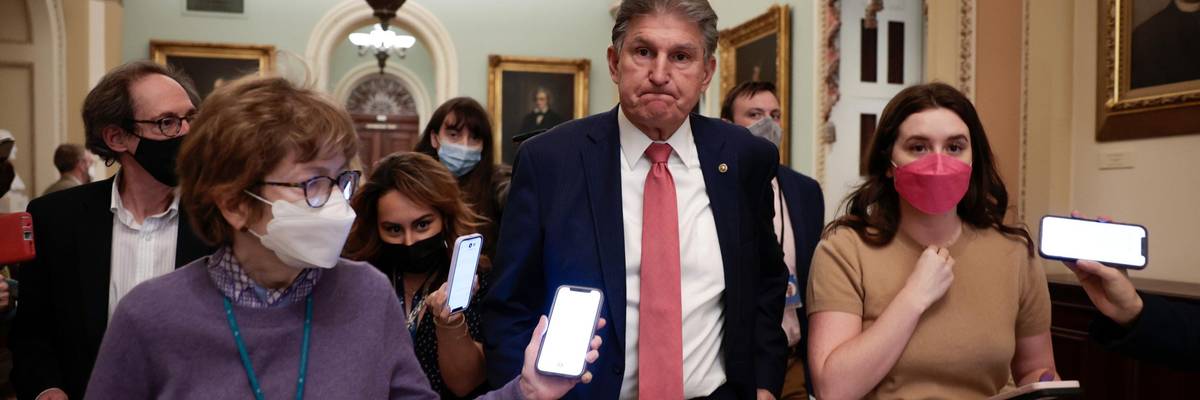

SUBSCRIBE TO OUR FREE NEWSLETTER
Daily news & progressive opinion—funded by the people, not the corporations—delivered straight to your inbox.
5
#000000
#FFFFFF
To donate by check, phone, or other method, see our More Ways to Give page.


Daily news & progressive opinion—funded by the people, not the corporations—delivered straight to your inbox.

Sen. Joe Manchin (D-W.Va.) is followed by reporters as he leaves a caucus meeting with Senate Democrats at the U.S. Capitol Building on December 17, 2021 in Washington, D.C. (Photo: Anna Moneymaker/Getty Images)
New federal disclosures reveal that major corporations poured donations into West Virginia Sen. Joe Manchin's political action committee in the weeks leading up to his pivotal announcement Sunday that he would oppose the Build Back Better Act, a stance that progressives argue is motivated by the senator's deference to special interests.
CNBC reported late Tuesday that Federal Election Commission (FEC) filings show that donors to Manchin's Country Roads PAC raked in 17 contributions from corporations in October and 19 in November as he pared back and repeatedly threatened to tank Democrats' $1.75 trillion social spending and climate legislation.
Manchin donors during that period, according to CNBC, included corporate behemoths such as Goldman Sachs, American Express, UnitedHealth Group, Blue Cross Blue Shield, and Lockheed Martin, many of which took part in the massive big business lobbying blitz against the bill, which included key child poverty-reducing benefits and significant investments in clean energy.
"Country Roads raised over $150,000 in October from corporate donors such as Verizon, Union Pacific, Wells Fargo, and PACs tied to the coal and mining industries," CNBC noted.
As founder of the West Virginia-based coal company Enersystems, Manchin is well acquainted with the fossil fuel industry, which donated at least $400,000 to the West Virginia Democrat between July and October as he worked to gut the Build Back Better Act's key climate provisions. The Washington Post reported last week that Manchin's share in Enersystems--currently run by the senator's son--is "worth between $1 million and $5 million."
Related Content

In a blog post earlier this week, former Labor Secretary Robert Reich noted that last year Manchin "made half a million dollars in Enersystems dividends (roughly three times the $174,000 salary he made last year as a senator)."
Reich cited such income--as well as the fact that Manchin "collects more campaign money from coal, oil, and gas companies than any other senator"--as possible explanations behind the West Virginia Democrat's decision to block his party's flagship legislation, which he announced in an appearance on the right-wing network Fox News.
Democratic leaders are still working to salvage the Build Back Better Act, but it's unclear how much they would have to water down the already badly weakened legislation in order to win Manchin's support. The death of the Build Back Better package would likely push millions of children back into poverty, potentially blow a $60 billion hole in the U.S. economy, and thwart what advocates see as a once-in-a-generation opportunity to pass meaningful climate legislation.
"This is the way things work when democracy has been weakened," the Democracy Initiative--a coalition of dozens of civil rights, environmental, and labor groups--said Wednesday. "The powerful get special access to our government, while we're told, 'Sorry, we can't help you.'"
Dear Common Dreams reader, The U.S. is on a fast track to authoritarianism like nothing I've ever seen. Meanwhile, corporate news outlets are utterly capitulating to Trump, twisting their coverage to avoid drawing his ire while lining up to stuff cash in his pockets. That's why I believe that Common Dreams is doing the best and most consequential reporting that we've ever done. Our small but mighty team is a progressive reporting powerhouse, covering the news every day that the corporate media never will. Our mission has always been simple: To inform. To inspire. And to ignite change for the common good. Now here's the key piece that I want all our readers to understand: None of this would be possible without your financial support. That's not just some fundraising cliche. It's the absolute and literal truth. We don't accept corporate advertising and never will. We don't have a paywall because we don't think people should be blocked from critical news based on their ability to pay. Everything we do is funded by the donations of readers like you. Will you donate now to help power the nonprofit, independent reporting of Common Dreams? Thank you for being a vital member of our community. Together, we can keep independent journalism alive when it’s needed most. - Craig Brown, Co-founder |
New federal disclosures reveal that major corporations poured donations into West Virginia Sen. Joe Manchin's political action committee in the weeks leading up to his pivotal announcement Sunday that he would oppose the Build Back Better Act, a stance that progressives argue is motivated by the senator's deference to special interests.
CNBC reported late Tuesday that Federal Election Commission (FEC) filings show that donors to Manchin's Country Roads PAC raked in 17 contributions from corporations in October and 19 in November as he pared back and repeatedly threatened to tank Democrats' $1.75 trillion social spending and climate legislation.
Manchin donors during that period, according to CNBC, included corporate behemoths such as Goldman Sachs, American Express, UnitedHealth Group, Blue Cross Blue Shield, and Lockheed Martin, many of which took part in the massive big business lobbying blitz against the bill, which included key child poverty-reducing benefits and significant investments in clean energy.
"Country Roads raised over $150,000 in October from corporate donors such as Verizon, Union Pacific, Wells Fargo, and PACs tied to the coal and mining industries," CNBC noted.
As founder of the West Virginia-based coal company Enersystems, Manchin is well acquainted with the fossil fuel industry, which donated at least $400,000 to the West Virginia Democrat between July and October as he worked to gut the Build Back Better Act's key climate provisions. The Washington Post reported last week that Manchin's share in Enersystems--currently run by the senator's son--is "worth between $1 million and $5 million."
Related Content

In a blog post earlier this week, former Labor Secretary Robert Reich noted that last year Manchin "made half a million dollars in Enersystems dividends (roughly three times the $174,000 salary he made last year as a senator)."
Reich cited such income--as well as the fact that Manchin "collects more campaign money from coal, oil, and gas companies than any other senator"--as possible explanations behind the West Virginia Democrat's decision to block his party's flagship legislation, which he announced in an appearance on the right-wing network Fox News.
Democratic leaders are still working to salvage the Build Back Better Act, but it's unclear how much they would have to water down the already badly weakened legislation in order to win Manchin's support. The death of the Build Back Better package would likely push millions of children back into poverty, potentially blow a $60 billion hole in the U.S. economy, and thwart what advocates see as a once-in-a-generation opportunity to pass meaningful climate legislation.
"This is the way things work when democracy has been weakened," the Democracy Initiative--a coalition of dozens of civil rights, environmental, and labor groups--said Wednesday. "The powerful get special access to our government, while we're told, 'Sorry, we can't help you.'"
New federal disclosures reveal that major corporations poured donations into West Virginia Sen. Joe Manchin's political action committee in the weeks leading up to his pivotal announcement Sunday that he would oppose the Build Back Better Act, a stance that progressives argue is motivated by the senator's deference to special interests.
CNBC reported late Tuesday that Federal Election Commission (FEC) filings show that donors to Manchin's Country Roads PAC raked in 17 contributions from corporations in October and 19 in November as he pared back and repeatedly threatened to tank Democrats' $1.75 trillion social spending and climate legislation.
Manchin donors during that period, according to CNBC, included corporate behemoths such as Goldman Sachs, American Express, UnitedHealth Group, Blue Cross Blue Shield, and Lockheed Martin, many of which took part in the massive big business lobbying blitz against the bill, which included key child poverty-reducing benefits and significant investments in clean energy.
"Country Roads raised over $150,000 in October from corporate donors such as Verizon, Union Pacific, Wells Fargo, and PACs tied to the coal and mining industries," CNBC noted.
As founder of the West Virginia-based coal company Enersystems, Manchin is well acquainted with the fossil fuel industry, which donated at least $400,000 to the West Virginia Democrat between July and October as he worked to gut the Build Back Better Act's key climate provisions. The Washington Post reported last week that Manchin's share in Enersystems--currently run by the senator's son--is "worth between $1 million and $5 million."
Related Content

In a blog post earlier this week, former Labor Secretary Robert Reich noted that last year Manchin "made half a million dollars in Enersystems dividends (roughly three times the $174,000 salary he made last year as a senator)."
Reich cited such income--as well as the fact that Manchin "collects more campaign money from coal, oil, and gas companies than any other senator"--as possible explanations behind the West Virginia Democrat's decision to block his party's flagship legislation, which he announced in an appearance on the right-wing network Fox News.
Democratic leaders are still working to salvage the Build Back Better Act, but it's unclear how much they would have to water down the already badly weakened legislation in order to win Manchin's support. The death of the Build Back Better package would likely push millions of children back into poverty, potentially blow a $60 billion hole in the U.S. economy, and thwart what advocates see as a once-in-a-generation opportunity to pass meaningful climate legislation.
"This is the way things work when democracy has been weakened," the Democracy Initiative--a coalition of dozens of civil rights, environmental, and labor groups--said Wednesday. "The powerful get special access to our government, while we're told, 'Sorry, we can't help you.'"